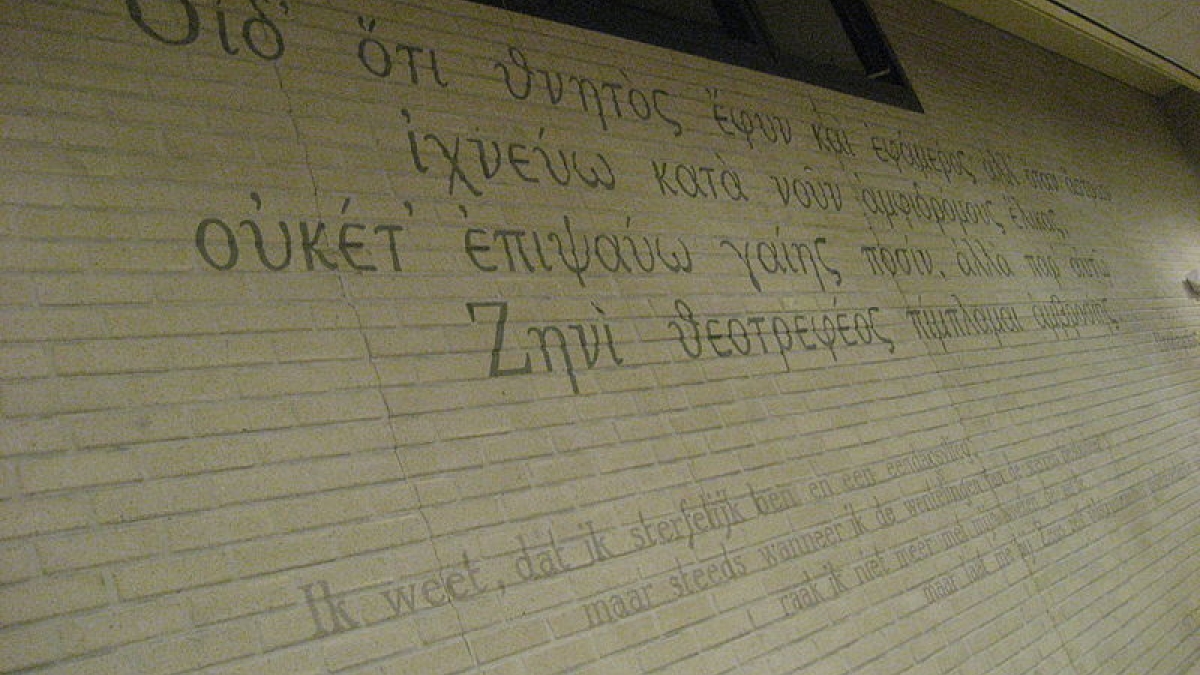Mike Tueller
What does Twitter, one of today’s biggest social media sites, have to do with ancient Greek poetry that was written more than 2,000 years ago?
The connections are broader than one might think, according to Mike Tueller, an associate professor of Greek in Arizona State University’s School of International Letters and Cultures.
Tueller will be exploring those connections between Twitter and short Greek poems called epigrams in his talk, “The Original Tweets: Tiny Poems of the Ancient Greeks” at 6:30 p.m. on Thursday, March 16 on ASU’s Downtown Phoenix campus.
“Twitter is a genre that is constrained by technology, very similar to epigrams,” Tueller said. “Some people look at Twitter and think, ‘How can you make any kind of social commentary in such a small space?’”
But “there's always been brief genres and while you can't do everything, you can do some things,” he said.
Tueller is working on a revision of the Greek Anthology (the primary source for Hellenistic epigram) for the Loeb Classical LibraryThe Loeb Classical Library is a series of books that provides access to Greek and Latin literature and is currently published by the Harvard University Press., a project that will take the better part of a decade. His research focuses on the Hellenistic period, when Greek language and culture started to spread across the Mediterranean.
“Professor Tueller combines an absolute mastery of the ancient Greek language with a keen eye for literary detail and sly wit,” said Matt Simonton, an assistant professor in the School of Humanities, Arts and Cultural StudiesThe school is part of the New College of Interdisciplinary Arts and Sciences.. “You will come out of his courses feeling like you've truly earned your newfound knowledge of Greek, but you'll also have heard some good jokes along the way.”
Tueller doesn’t make his jokes on Twitter, but he is a fan of the application. He also finds himself fascinated at how certain things go viral, finding that the fame that comes from that is similar to what writers sought back in the 10th century.
“What makes a tweet good? There are a number of different ways to do it, whether it’s referring to something bigger or making a joke.,” Tueller said. “Epigrams are often that way too.”
The earliest Greek epigrams were inscribed on monuments or offerings at sanctuaries. And just as comedians work today to create “memes,” riffing on top of one another to try and make better jokes, writers of these epigrams did the same thing as they attempted to make new and better meanings.
“They had to reinforce their cultural narrative,” Tueller said. “They wanted to prove how smart they were, how complex their literature was, and how amazing Greeks were.”
Tueller will spend roughly half of Thursday’s lecture talking about those epigrams and what made them special, while taking the rest of the time to explore the medium of Twitter and the connections between the two.
The talk is part of the College of Integrative Sciences and Arts spring 2017 Humanities Lecture Series. It will be held in room 128 inside the Walter Cronkite School of Journalism and Mass Communication on the Downtown Phoenix campus. Admission to the event is free.
Photo by Vysotsky (Wikimedia)
More Arts, humanities and education

Professor's acoustic research repurposed into relaxing listening sessions for all
Garth Paine, an expert in acoustic ecology, has spent years traveling the world to collect specialized audio recordings.He’s been to Costa Rica and to Ecuador as part of his research into innovative…

Filmmaker Spike Lee’s storytelling skills captivate audience at ASU event
Legendary filmmaker Spike Lee was this year’s distinguished speaker for the Delivering Democracy 2025 dialogue — a free event organized by Arizona State University’s Center for the Study of…

Grammy-winning producer Timbaland to headline ASU music industry conference
The Arizona State University Popular Music program’s Music Industry Career Conference is set to provide students with exposure to exciting career opportunities, music professionals and industry…



